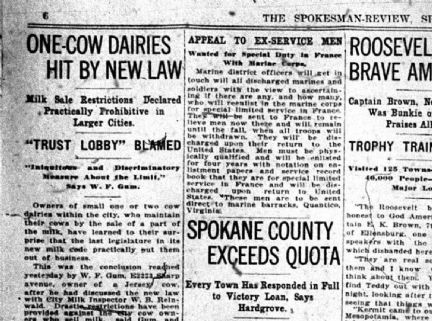| T O P I C R E V I E W |
| maryjane |
Posted - May 14 2019 : 12:25:16 PM

Owners of dairy cows in cities were learning of a recently-passed state law that created
significant obstacles for them to continue selling milk, The Spokesman-Review reported
on May 11, 1919. (Spokesman-Review archives)
100 years ago in Spokane: Urban farmers with cows squeezed by new Washington law
By Jonathan Brunt
Urban farming was becoming more difficult in Washington.
Owners of dairy cows in cities were learning of a recently-passed state law that created significant obstacles for them to continue selling milk.
“The little girl who came to your back door with a pail to receive her quart of milk can come no longer, unless her order is filled in an up-to-date milk house, built along sanitary lines suggested by the milk trust of Spokane and other cities,” said W.F. Gum who lived at 2223 E. Sharp Ave. and owned a Jersey cow.
Gum blamed large milk distributors for the new law. Spokane Milk Inspector W. B. Reinwald stressed that the city did not lobby for the law and said that state inspectors, not himself, would be enforcing it.
Gum said he sold $1 worth of milk a day by selling milk for 12 1/2 cents a quart. But his feed bill was $20 a month.
“After selling enough milk to pay for the feed and a little for my trouble, I have enough milk left for my family, which is really my compensation for keeping the cow,” Gum told The Spokesman-Review.
From The Spokesman-Review: https://bit.ly/2WI7nyd |
|
|
![[flourish]](/images/flourish-txt_mobius.png)
![[flourish]](/images/flourish-txt_mobius.png)